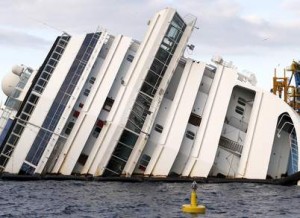206.624.8844
Trial Date Set For Captain Of The Costa Concordia
Earlier this month, prosecutors in Italy rejected a plea bargain offer from Frencesco Schettino, the captain of the Carnival cruise vessel Costa Concordia at the time it hit a reef and capsized. Schettino is accused of manslaughter, causing a shipwreck and abandoning ship while many of the 4,229 passengers and crew were still aboard the vessel. The 290-meter Costa Concordia struck rocks and sank outside the Tuscan port of Giglio in January of 2012, and 32 people died in the catastrophe. The Costa Concordia still lies on its side in the location of the sinking, and has since become a tourist attraction.
 Schettino offered to serve three years and four months in prison for his role in causing the vessel sinking as part of a plea bargain, but prosecutors rejected this offer. If convicted, Schettino may serve as much as 20 years in prison. Prosecutors have already made plea deals with five other Costa Concordia officers, and the deals have since been approved by the court. However, other officers are described as having played a “marginal” role in the disaster. Schettino is the only remaining defendant in the case and will be the only defendant in the trial beginning July 9. The trial will be held in Grosseto, the city nearest the site of the shipwreck.
Schettino offered to serve three years and four months in prison for his role in causing the vessel sinking as part of a plea bargain, but prosecutors rejected this offer. If convicted, Schettino may serve as much as 20 years in prison. Prosecutors have already made plea deals with five other Costa Concordia officers, and the deals have since been approved by the court. However, other officers are described as having played a “marginal” role in the disaster. Schettino is the only remaining defendant in the case and will be the only defendant in the trial beginning July 9. The trial will be held in Grosseto, the city nearest the site of the shipwreck.
The Costa Concordia hit ground around dinner time and spawned a chaotic nighttime evacuation. Schettino left the vessel and was reported to be watching the evacuation from shore while many of the passengers and crew remained in peril. The ship listed so badly to one side that some of the life boats couldn’t be launched and many people had to jump into the sea and swim to shore in the dark. In a recording of a telephone call between the Italian coast guard and Shettino, the coast guard famously ordered Schettino to “get back aboard, damn it!”
Explaining its decision to reject Schettino’s plea bargain offer, the Grosseto state prosecutor’s office stated, “It must be reiterated that the accused Schettino almost exclusively carries the weight for the striking chain of errors committed.” Prosecutors assert that at the time of the allision, Schettino was on the telephone and distracted, and had been seen enjoying dinner with a female passenger hostess on the bridge minutes before the ship struck ground. There are also allegations that Schettino steered the ship too dangerously close to the island as part of a publicity stunt.
Schettino admits that he made mistakes, but claims that the reef the vessel struck was not on nautical charts. His lawyers say he is being made a scapegoat for what was simply an accident.
Costa Cruises, a part of Carnival Corporation, agreed to pay a $1.3 million fine in April. Most of the passengers have already accepted compensation of about $14,200, while others continue to pursue their claims.
The Costa Concordia disaster raises a number of important rules of maritime law, including two major legal presumptions regarding causation of the shipwreck. Under “the Pennsylvania rule,” any time a vessel violates a safety statute, and an accident occurs which the safety statute was intended to prevent, it is presumed that the vessel’s statutory violation caused the accident. The Pennsylvania rule was first established by the U.S. Supreme Court in 1873 in The Pennsylvania, 86 U.S. 125 (1873). Where the Pennsylvania rule applies, the burden rests upon the ship of showing not merely that the statutory violation may not have caused the incident, or that it probably did not, but that it could not have been the cause. This heavy burden is extremely difficult, if not impossible, for the violator to discharge. In the case of the Costa Concordia, any violation of a statute regulating navigation should raise the presumption that vessel negligence caused the shipwreck. Another important presumption arises under the Oregon rule which provides that where a vessel strikes a stationary object, in this case the rocks off the coast of Italy, there is a rebuttable presumption that the moving vessel is at fault for the collision.
 Seattle Maritime Injury Lawyer Blog
Seattle Maritime Injury Lawyer Blog

